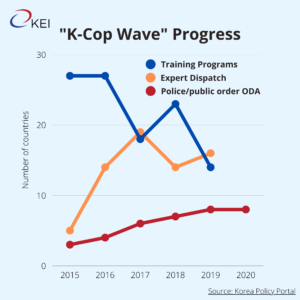The Peninsula
Ethics of South Korea’s Overseas Development Assistance
Published July 10, 2022
Author: Yu Na Choi, Korea View
Category: Korea Abroad, South Korea, Current Events

South Korea’s National Police Agency hosted the second annual Korea-ASEAN International Crime Capacity Building Program between July 4 and 15, 2022. Ongoing efforts to transfer policing know-how to participating Southeast Asian countries supported the previous administration’s initiative to bolster ties with the region. It also represented South Korea’s use of its good governance record to engage with international partners. However, this model stands in tension with expectations for Seoul to become a more vocal advocate of democratic values.

There were initial concerns that Seoul was globalizing a policing model that lacks domestic public support. However, South Korea successfully built on its reputation of highly sophisticated cyber/forensic capabilities and public safety records to attract ASEAN countries to this channel of engagement.
South Korea also does not demand strict adherence to political, civil, or human rights in countries receiving development assistance. Likewise, the “K-Cop Wave” has maintained the principle of non-interference and avoided any value-based assessment of the assistance provided.
However, civil society groups have voiced concerns about the potential use of South Korean policing know-how as a tool of repression. The intensification of democratic regression in Southeast Asian countries during the pandemic sharpened this concern. Given Yoon’s stated aims to pursue a value-based foreign policy, these existing programs around policing or other governance know-how may become subject to greater scrutiny depending on the state of human and democratic rights in recipient countries.
The shape of Korea’s future engagement with Southeast Asia will be further shaped by ASEAN countries’ own focus on building a more “rules-based” and “people-centered” community as envisioned in the APSC Blueprint 2025.
This briefing comes from Korea View, a weekly newsletter published by the Korea Economic Institute. Korea View aims to cover developments that reveal trends on the Korean Peninsula but receive little attention in the United States. If you would like to sign up, please find the online form here.
Korea View was edited by Yong Kwon with the help of Jae Chang, Kaitlyn King, Yu Na Choi, and Mai Anna Pressley. Picture from the flickr account of Ju Han Kim
